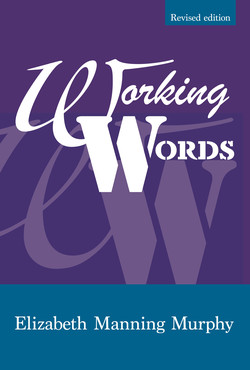Оглавление
Elizabeth Manning Murphy. Working Words
Copyright and publishing information
Contents
Preface to the first edition
Acknowledgements
Preface to the revised edition
Acknowledgements
Publisher’s note on pages in the ebook
itchypencil 1. Collective editors
1. Working words: the editor’s job
2. Who exactly are you, editor?
What exactly do we mean by the term ‘editor’?
Professionalism
Responsibilities
Skills
3. Your friendly computer
4. On-screen editing
5. Variety in editing jobs
6. Seven deadly sins
Sin No 1: Writing a slapdash EOI or quote
Sin No 2: Not owning and using standard reference books
Sin No 3: Losing your copy of the Standards
Sin No 4: Thinking you can compete in a highly technological world with antique technology
Sin No 5: Resting on your laurels
Sin No 6: Not being meticulous and crystal clear in your editing work
And the seventh deadly sin? Sloth
7. Getting on with clients
Listen
Keep in touch
Use plain English
Smile!
Don’t assume
Be patient
Finally, be honest
itchypencil 2. Oops! False advertising?
8. Courtesy, cribs and copyright
9. Disclaimers
Why have a disclaimer at all?
What sort of message is a disclaimer trying to get across?
10. Editing students’ work
11. The ethics of editing
Ethics in academic editing
General editing ethics
Other forms of unacceptable behaviour
itchypencil 3. When ‘brief’ does not equal ‘plain’!
12. Project management
What is a project?
What is project management?
13. Project definition
Responding to the invitation to quote
Assessing the task from a sample
A sample assessment
14. Quoting: broad aspects
15. The proposal and quote
16. Invoicing
17. Office organisation
18. Editor, edit thyself
19. Editing on the move
20. Keeping in touch: emailing
21. A roundup
Where have we been?
Where are we now?
Where to from here?
itchypencil 4. A traveller’s tale
22. Why grammar?
So, what is grammar?
What destroys grammar?
How can we as editors help in these circumstances?
23. Rules, shmules!
‘Never begin a sentence with and or but.’
‘Never begin a sentence with because.’
‘Use that, not which, for restrictive clauses when referring to an inanimate referent.’
‘Between is only used with two, among with three or more.’
‘Less for uncountable, fewer for countable nouns’
‘Wishful thinking requires the subjunctive form of the verb.’
‘Never split an infinitive.’
24. Parts of speech: some of the players
Nouns
Pronouns
Adjectives
Adverbs
25. Parts of speech: more of the players
Verbs
Prepositions
Conjunctions
Interjections
26. The arbitrating article
27. Relationships
Which preposition to use?
Position of the preposition in a sentence
When is a preposition not a preposition?
28. Verbs: some basics
Tense
Mood
Transitivity
‘Being’ verbs
29. Verbs: more basics
Voice
Subject–verb agreement
More complex verbs
Placement of adverbs
30. ‘Nerbs’
31. One or more than one
Agreement
Forming plural nouns in English
itchypencil 5. Distracting signs
32. Voice: active or passive?
33. Case: from Latin to modern English
A case system
Declension of a noun in Latin
Personal pronouns
A word about singular they (as used in these chats)
34. ‘That’ pesky word
35. Please allow my fancying possessives before gerunds
36. Confusions
affect, effect
imply, infer
lay, lie
37. More confusions
adherence, adhesion
aggravate, irritate
alternate, alternative
cheap, inexpensive
comprise, consist
continual, continuous
desert, dessert
disinterested, uninterested
equable, equitable
fewer, less
if, whether
38. Even more confusions
interstate, intestate, intrastate
lend, loan
passed, past
scrip, script
shall, will
who, whom
39. What is a sentence?
What is NOT a sentence?
40. Stacking sentences
41. Shall we dance?
And then there was than
Spelling and grammar checking tools
42. May I? Might I?
itchypencil 6. Watch out! A roadside warning
43. Pausing with purpose
The hierarchy of punctuation
Comma fault
The colon: not a semicolon
44. How much punctuation is necessary?
Abbreviations
Numbers and commas
Quotation marks
Em rule or en rule?
Punctuation with ‘however’
A rule for the changing English language
Speaking of which …
45. What’s the point?
46. The powerful ’postrophe
Apostrophes for omission
Apostrophes for possession
47. Apostrophe do’s and don’ts
Blackboard special’s
Other plurals and the apostrophe
Do’s and don’t’s?
The disappearing apostrophe?
48. The humble hyphen
49. Dash it!
When to use the em rule (usually unspaced)
When to use the en rule
When to use the double em rule
itchypencil 7 ‘Norf’k’ – and the geese and cows
50. A reflection on ‘style’ from 1804
51. Plain English is the style
Sentence length and readability
Parallel structure in lists
Voice: active or passive
Use of verbal nouns
Choice of words for the target audience and the topic
Use of jargon
52. Strong, plain sentences
Revise weak be verbs
Avoid starting sentences with It is and There is
Avoid agentless passives
Unpack long sentences
A weakening pronoun
53. How not to write
54. Avoid style crampers
Articles
Plurals
Plurals plus numerators
Prepositions
Verb tense for meaning
Proximity of adverbs and verbs
Proximity of subjects and verbs
Subject–verb agreement
Apostrophes for possession and omission – not plural
Possessive pronouns
55. Ambiguity, vagueness and other traps
Ambiguity
Poor reference, ambiguity and misuse of words
56. Sentence structure snares
Fragments
Questions in surveys and forms
57. 1 or 2 words about numbers
58. Say what you mean – in actual fact
59. Colloquialisms – colourful but clunky
Cop this!
Flat out like lizards drinking
Shoot through
Kick the tin, the bucket and others
Poke in the eye with a burnt stick
Chinwag
itchypencil 8. Only in Melbourne!
60. Inclusiveness: who is ‘s/he’?
61. International English
62. Editing ESL writing
Lack of or misuse of articles
Wrong tenses of verbs
Wrong choice of verb
Misuse of prepositions
Misplacement of adverbs
Lack of plural marker on nouns
63. Whither grammar and plain English?
References
Index
